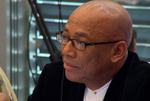Juge Emile SHORT
contribution 40 -
SHORT Emile Francis

original version
I will try to be brief. I had indicated to the organisers that I was going to speak on the legacy and impact of the Tribunal. But I realised that it will sound more like an academic discourse, and so I have abandoned the idea. I just wanted to talk about the common law or civil law system based on a lot of the observations that have been made in the course of the day and especially yesterday.
I was trained as a common law lawyer. And I came to the Tribunal, you know, steeped in the common law tradition. But having sat in some of the highly complex multi‑accused trials trials, which involve a lot of events and a lot of issues, I am firmly of the view that the common law system, in which the Prosecution and the Defence do their investigation, in many cases open‑ended extensive investigations, and present a lot of information which, in the end, we may not use, is not ideal for dealing with these highly complex cases at the ad hoc international tribunals.
I find that the common law system has tended to lead to lengthy trials. A lot of issues have been raised today, namely, exculpatory evidence and collection of evidence during the investigation stage. I think that these are matters that will be better dealt with in a system where there is greater judicial control of the investigation stage of the proceedings.
In this regard, I have looked at the procedure in the Extraordinary Chambers of Cambodia, and it’s a model which I think is probably most suitable for dealing with highly complex international crimes. In that system the investigation is opened by co‑prosecutors who investigate and see whether there’s been a commission of a crime and identify suspects or accused persons, and then they would present a submission to co‑investigating judges.
Now, these co‑investigating judges have the responsibility to investigate impartially, and this is extremely important. They have the responsibility to collect evidence, both exculpatory and inculpatory. They are acting both on behalf of the Prosecution as well as the Defence. They are acting more or less in the interests of the state and in an attempt to uncover the truth. The co‑investigating judges have the power to question suspects, charge persons, interview victims and witnesses, seize physical evidence, talk to expert witnesses, issue summons and so on. During the investigation by the co‑investigation judges, the parties, that is, the prosecution and the defence, are entitled to ask the co‑investigating judges to do additional investigation on various areas where they consider appropriate. At the end of this investigation by the co‑investigation judges, a dossier would be compiled.
Now, the co‑investigating judges are familiar with the elements of the offences, they know the kind of evidence that will be relevant, and they know the kind of witnesses that will be relevant. I think that it would make for a more efficient and effective investigation and trial if this sort of procedure was adopted. So that the evidence that will be used at the trial which would be conducted by another set of judges would be the evidence that has been collected by the co‑investigating judges, and the co‑investigating judges would decide who should be charged.
Now, I think that is a more effective system. And even though I make this observation as a common law lawyer, and whilst I was satisfied with my system when I came to the ICTR, I have come to the conclusion that, for at least the highly complex cases, which involve extensive investigation and involve a multiplicity of issues, the model that is being used in the Extraordinary Chambers of Cambodia will be a more suitable and more effective and efficient system for dealing with highly complex international crimes. Thank you.
J.M. SOREL
C’est une remarque très intéressante et ce qui sera le juste mot de conclusion. Je constate que les Juges eux-mêmes sont tout à fait conscients des améliorations nécessaires dans la procédure, c’est un point extrêmement positif.
Alors, Arusha serait-il un contre-modèle et le modèle serait-il le Tribunal pour le Cambodge ? J’ai entendu aussi des choses pas toujours très positives sur le Tribunal sur le Cambodge.
Nous sommes un petit peu en retard, mais nous avons commencé un peu en retard. En tout cas, ma mission est terminée.
Je suis vraiment désolé auprès de tous ceux que j’aurais pu frustrer dans leur temps de parole, mais j’ai essayé de faire en sorte que tout le monde puisse s’exprimer le plus possible et sur tous les thèmes. Donc, maintenant, nous allons déjeuner et je vous remercie beaucoup.
(Suspension de séance: 12h45)
(Recessed at 12h45 pm)

